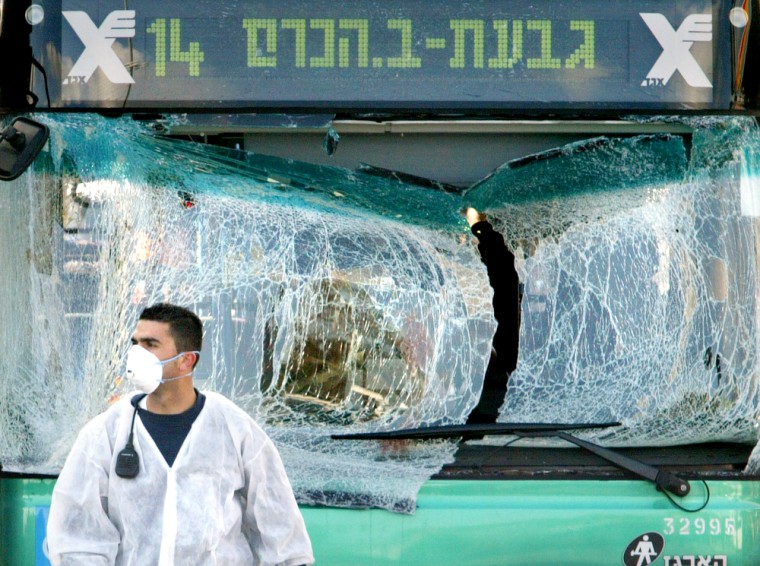Israeli Prime Minister Ariel Sharon met his top security advisers to consider a response to a Palestinian suicide bombing that killed eight passengers on a Jerusalem bus — a day before a world court hearing on Israel’s disputed security barrier.
Sharon did not announce a decision, but analysts predicted Israeli military action in Bethlehem since the bomber in Sunday’s attack came from a nearby village. Israeli officials said the bombing proved the need of the security barrier.
The powerful blast on the bus “was like an earthquake,” witness Ora Yairov told Israel TV.
Overnight, Israeli forces demolished overnight the bomber’s home in the village of Hussan, the army said. Israel says it demolishes the homes of suicide bombers to deter attackers but Palestinians condemn the policy as collective punishment.
Aftershocks from the suicide attack were felt in The Hague, Netherlands, where the International Court of Justice began a hearing about the Israeli barrier on Monday, with Israeli and Palestinian groups deploying outside to demonstrate.
Palestinian officials, trying to mobilize world support for their case, were furious. Prime Minister Ahmed Qureia said, “We look with anger at what happened today, especially its timing and place. There is an attempt to harm the mission to The Hague.”
In Washington, a White House official, speaking on condition of anonymity, said Qureia did not go far enough. “It is time to move beyond words and take action to dismantle these terrorist networks,” he said.
Preparing for more attacks
Israeli military officials, speaking on condition of anonymity, said soldiers and police were preparing for Palestinian attacks on Monday, including attempts to damage the barrier.
Israel insists it needs the barrier — a complex of walls, fences, trenches, lookout points and electronic sensors — to keep out suicide bombers.
Since violence erupted in September 2000, 463 people have been killed in 110 Palestinian suicide bombings. However, Palestinians complain the planned route of the barrier cuts deep into the West Bank, isolating towns and villages and leaving Israel in control of large parts of the territory.
The Jerusalem bombing was the first since Jan. 29, when 11 people were killed in a similar attack on a bus. Among the victims of the latest bombing were several high school students.
Israeli officials said the Sunday attack never would have happened had the section of the barrier being built around Jerusalem already been completed.
Defense Minister Shaul Mofaz said, “This terror attack (proves) the absolute necessity of the fence as a lifesaving instrument, and we are determined to continue its construction and complete it,” he said.
Laced with pieces of iron
The blast went off around 8:30 a.m., the peak of the morning rush hour, as the packed public bus drove past a gas station in downtown Jerusalem overlooking the brown stone walls of the Old City. Sunday is a regular weekday in Israel.
“There was a very strong noise of a bomb and a fierce light, like lightning,” said Nili Amotz, a 57-year-old social worker wounded in the bombing.
The bomb, laced with pieces of iron, killed eight people in addition to the bomber and wounded 59 others, rescue officials said.
American Jewish leaders were meeting with the Israeli army chief of staff at a Jerusalem hotel a few hundred yards from the scene of the blast.
“The closeness reminds (us) that everyone can be a victim of terror and nobody is immune,” said Malcolm Hoenlein, executive director of the Conference of Presidents of Major American Jewish Organizations, who hurried to the scene.
The Al Aqsa Martyrs’ Brigades, a militant group loosely affiliated with Qureia’s and Yasser Arafat’s Fatah movement, claimed responsibility for the attack and identified the bomber as Mohammed Zool, 23, from the village of Hussan.
The explosion ripped apart the back of the green bus and scattered body parts and shattered glass across a two-block radius.
Just before the blast, Israel began pulling down a particularly contentious 5-mile section of fence that isolated the Palestinian town of Baka al-Sharkia from the rest of the West Bank.
Israel’s Defense Ministry said that section of fence is not needed because a new section of barrier separating Baka al-Sharkia from Israel is in place.
Israel has come under pressure to reroute the barrier closer to the West Bank boundary and lessen its effect on the lives of Palestinians.
